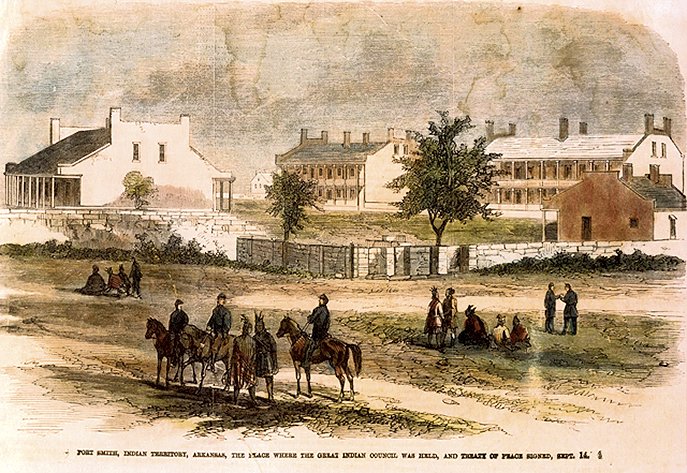As alliances across what was known as the United States fractured during the Civil War, so did those among American Indian tribes in what is now the state of Oklahoma.
"After the war, the government wanted to broker peace between tribes settled in Indian Territory," says Jeremy Lynch, a ranger at the Fort Smith National Historic Site. "Tribes chose sides during the Civil War, and some even split -- with some staying with Union and others supporting the Confederacy. And they were living next to each other."
FAQ
Anniversary Symposium:
Council of 1865
WHEN — 10 a.m.-5 p.m. Saturday
WHERE — Fort Smith National Historic Site, Fort Smith Museum of History & Frisco Railroad Station, all in Fort Smith
COST — Free
INFO — 226-3723
"In September of 1865, the U.S. Commissioner of Indian Affairs met with representatives of 13 Indian nations in Fort Smith," reads the introduction of a transcript of a 1985 remembrance of the Great Indian Council. "The purpose of this historic meeting -- known as the Fort Smith Council -- was to reestablish formal relations between the tribes and the United States government in the aftermath of the Civil War.
On the 150th anniversary of the council, the Fort Smith national park presents "1865 to 2015: Remembering the Great Indian Council of 1865." The event Saturday includes cultural exhibits by members of modern tribes, interpretive programs by the U.S. Colored Troop soldiers and freedmen, an exhibit with 1865 portraits taken during the council and a symposium with five speakers addressing various topics of the time.
Because of the Civil War, all of the federal government's treaties with Indians became "null and void" because the tribes or members of the tribes fought against the Union, Lynch explains. Additionally, many tribes signed treaties with the Confederacy for protection after the federal government pulled troops out of Indian Territory and Fort Smith when the state of Arkansas seceded from the Union.
At their arrival in Fort Smith in 1865, representatives of the various Indian tribes were surprised by the introduction of new, unexpected rules required for treaties.
"(The U.S government) wanted one central Indian government, rather than having to deal with numerous individuals and tribes," Lynch says. "That meant they were going to be treated exactly the same, every single one of the 15 tribes, whether they supported the Confederacy or not."
Other controversial stipulations required the tribes to agree not to take up arms against the United States or other tribes, and that they would free their slaves, Lynch lists.
"What started here -- in the barracks, the building would later become Judge Parker's courtroom -- on Sept. 15-19, 1865, led to the treaties of 1866, which many of the tribes still use," Lynch says.
Daniel Littlefield of the University of Arkansas Little Rock noted during the 1985 conference that what was couched as "reconstruction" was actually "re-destruction" of the Indian nations. He will speak about the council during this year's event.
The treaties of 1866 redrew the borders of Indian Territory to provide land for peaceful tribes moved from Texas and Kansas, Lynch says. And the treaties opened the way for railroads to run through the Indian Territory, taking more land from the natives.
"Many of the tribes were near bankruptcy at this time," Lynch says. "Along with the treaties, the Civil War also erased the government's debt to the Indians (set in treaties as compensation for the removal from their eastern lands). So Indians began to sell off lands to the government after the 1866 treaties. With payments over time, this got those tribes up and going again."
The topics presented at Saturday's symposium -- Indian policy, the Fort Smith Council and the Treaty of 1866 -- hopefully will lead to "bigger stories we have to to tell on military force, the federal government and Indian removal."
NAN What's Up on 09/11/2015

